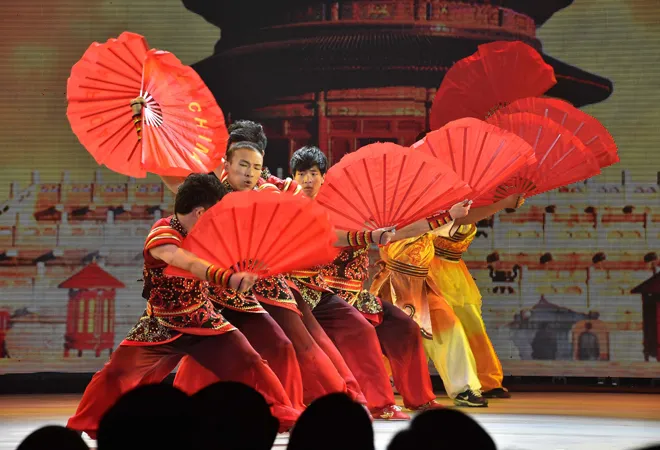 This is the sixty third part in the series
This is the sixty third part in the series The China Chronicles.
Read all the articles here.
The role played by summit meetings in international politics and engagements of post-colonial Africa can be located within a context dominated by several interlinked factors, including the very process of de-colonisation. Formal powers and institutions were transferred from European to African states’ as they started attaining independence. In this context, newly independent African states began their international politics wherein summit meetings, or a series of ad-hoc meetings between heads of government’s became an established means of voicing African’ opinions, coordinating policies, and establishing diplomatic channels of communications.
Africa’s experience with summitry
Big powers have engaged with African countries through multilateral fora for a long time. France was the first to engage with the continent dating back to the 1970s. The US-Africa Leaders’ Summit took place in August, 2014. Not only western powers, but also Asian powers such as China, India and Japan have held summit meetings with African countries. Japan through the Tokyo International Conference on African Development (TICAD) launched in 1993, India through India-Africa Forum Summit (IAFS 2008, 2012, 2015) and China through the Forum on China-Africa Cooperation (FOCAC).
The experience of these countries engaging with African countries through summit meetings have been a success. Increasing numbers of African heads of state and governments’ have attended these meetings, thereby generating mutual trust and international awareness regarding Africa’s developmental needs. These summits have led to more open, accountable, diverse and multifaceted engagement between Africa and the rest of the world.
China and Africa’s engagement through FOCAC was launched in October 2000 at the first ministerial Conference held in Beijing. FOCAC is part of a growing trend of South-South Cooperation that provides an alternative to traditional development assistance mechanisms. The second ministerial conference took place in Addis Ababa in December 2003, third in 2006 Beijing, fourth in Sharm El-Sheik 2009, fifth in Beijing 2012, and the second FOCAC and sixth ministerial conference in December 2015 at Johannesburg. The forthcoming FOCAC Summit will be held in September, 2018 in Beijing.
The experience of these countries engaging with African countries through summit meetings have been a success. Increasing numbers of African heads of state and governments’ have attended these meetings, thereby generating mutual trust and international awareness regarding Africa’s developmental needs.
These summits have paved the way for China, although a late entrant like India, to make inroads into the African continent. China has set up industries and infrastructures in diverse fields in different parts of the continent. China is increasing its forays into Africa and has emerged as Africa’s largest trading and investment partner.
China-Africa partnership
China’s trade and investment partnership is vital for both trading partners. China views Africa as a growing source of raw materials — most importantly crude oil, iron ore, and copper — which have helped fuel China’s rapid infrastructure development. For Africa, China represents a major trading partner and investor that provides it with cheap consumer products, buys its natural resources, and helps build its infrastructure.
Over the past decade, China-Africa bilateral trade has been steadily increasing, interrupted by a slight slump and quick recovery following the 2009 financial crisis. However, weak commodity prices since 2014 have adversely impacted the value of African exports to China, even while Chinese exports to Africa remained steady.

China-Africa trade reached USD 220 billion in 2014 along with investments worth USD 32.4 billion, and is estimated to be about USD 300 billion by 2015. According to statistical data by China Customs, in January-December 2017, the import and export value of China-Africa trade amounted to USD 170 billion, up 14.1 percent year on year, 2.7 percent higher than the general increase of foreign trade in the same period. Among these, China’s exports to Africa reached USD 94.74 billion, up 2.7 percent. China’s imports from Africa reached USD 75.26 billion, up 32.8%. The trade surplus was USD 19.48 billion, down 45.2 percent year on year.
FOCAC
Since its inauguration, FOCAC has become a crucial component for institutionalising China’s relations with the African continent.
FOCAC is a multilateral platform for collective, pragmatic consultation and dialogue established jointly by Chinese and African leaders, “in order to further strengthen the friendly cooperation between China and Africa under the new circumstances, to jointly meet the challenge of economic globalisation and to promote common development.” The rhetorical focus is on equality, South-South cooperation, and mutual benefit.
Since its inauguration, FOCAC has become a crucial component for institutionalising China’s relations with the African continent.
The forum meets every three years and is held in Beijing or in an African country on an alternating basis. It charts out a three-year action plan which is carried out on a bilateral basis between countries and is monitored by a follow-up committee. FOCAC has five guiding values embodying the spirit of South-South cooperation namely: equality and mutual benefit, diversity in form and content, emphasis on practical results, pursuit of common progress, and amicable settlement of disputes.
China also seeks to engage with African multilateral fora. In the 2000 Beijing declaration of FOCAC and the 2003 Addis-Ababa Action Plan, China pledged its support to African Union (AU) and New Partnership for African Development (NEPAD). In 2006, a MoU was
signed between the FOCAC and NEPAD secretariats.
Both China and Africa are emphasising on issues related to environmental protection, especially since the fifth ministerial conference in 2012. As trade and investments in Africa is increasing, there is a greater need to monitor damage to environment and loss of biodiversity. With a large growing population, water scarcity, and poor soil quality, Africa’s population is very susceptible to climate change. Therefore, Africa needs to balance sustainable development efforts with economic growth and poverty alleviation.
In this respect, under the framework of FOCAC, efforts are being made to hold a conference on China-Africa Cooperation in Environmental Protection, set up China-Africa Environment Cooperation Center, launch the China-Africa Green Innovation project, and a China-Africa Joint Research Center project which aims to support African efforts in implementing clean energy and wildlife protection projects, and enhance their capacity to access the Green Climate Fund.
2015 Johannesburg summit
During the 2015 Johannesburg summit, China pledged to
invest USD 60 billion in African states which tripled the previous USD 20 billion commitment during the 2012 FOCAC summit in Beijing. However, most of funds are the in form of loans and export credits. The USD 60 billion
includes USD 5 billion for grants, USD 35 billion for concessional loans and export credits, and USD 5 billion each for the China-Africa Development Fund and the Special Loan for the Development of African small-and-mid-sized enterprises, and USD 10 billion for the China-Africa Industrial Capacity Cooperation Fund. These funds are expected to help address the bottlenecks in Africa’s economic and social development. The 2015 summit focused on key areas such as agricultural modernisation, industrialisation, trade and investment, public health among others.
African countries which have most experience with risk assessment or project management is most likely going to be biggest beneficiaries of Chinese development goals announced during FOCAC.
Whether China will be able to implement its commitments at a fast pace and accord priority to important areas of cooperation will ultimately depend on China’s bilateral relations with individual African countries. Although FOCAC action plans outline cooperation projects multilaterally between China and several African states, however China delivers on the projects bilaterally. This will lead African state leaders and other stakeholders to compete for these large sums of money. African countries which have most experience with risk assessment or project management is most likely going to be biggest beneficiaries of Chinese development goals announced during FOCAC. Given its current progress, China is on track to meet most of its financing commitments in areas such as industrialisation, agriculture development, and infrastructure.
Looking forward to 2018 summit
The upcoming FOCAC summit in Beijing will attempt to increase strategic consensus between China and Africa in order to maintain friendship and consolidate the political foundations for their unity and cooperation. Building on the success of 2015 Johannesburg summit, the summit will seek to inject an impetus into developing bilateral relations in this new era and will look to enhance national, global support and understanding of China-Africa cooperation. A key focal point of the summit will be on synergising the Belt and Road Initiative (BRI), United Nations 2030 Agenda for Sustainable Development, and development strategies of individual African countries.
China and African countries are looking to build a stronger community based on a shared-future in order to achieve ‘win-win’ cooperation, promote economic and trade cooperation, while taking the long-term benefits of trade into account. In this respect, there is need for more targeted and effective measures in order to align Africa’s vast wealth of natural resources, population dividends and market potential with Chinese investments, equipment and technology.
This will result in market-oriented cooperation instead of government-led cooperation, and will expand the focus from trade in commodities to developing African production capacities, and will lead to more investments rather than contracted projects.
The overall focus of the upcoming summit will revolve around discussions on a coordinated and balanced development of China-Africa cooperation, and will attempt to make greater headway in areas such as infrastructure, trade, financing, health, and human resource development. More than a dozen sub-forums and events are expected to occur on the sidelines of the summit where further discussions in fields of poverty reduction, improving living standards, and enhancing People-to-People (P2P) exchanges will take place. The upcoming Beijing summit will aim to promote South-South cooperation and secure stronger international support for Chinese and African developmental efforts.
The views expressed above belong to the author(s). ORF research and analyses now available on Telegram! Click here to access our curated content — blogs, longforms and interviews.



 This is the sixty third part in the series The China Chronicles.
Read all the articles
This is the sixty third part in the series The China Chronicles.
Read all the articles  China-Africa trade reached USD 220 billion in 2014 along with investments worth USD 32.4 billion, and is estimated to be about USD 300 billion by 2015. According to statistical data by China Customs, in January-December 2017, the import and export value of China-Africa trade amounted to USD 170 billion, up 14.1 percent year on year, 2.7 percent higher than the general increase of foreign trade in the same period. Among these, China’s exports to Africa reached USD 94.74 billion, up 2.7 percent. China’s imports from Africa reached USD 75.26 billion, up 32.8%. The trade surplus was USD 19.48 billion, down 45.2 percent year on year.
China-Africa trade reached USD 220 billion in 2014 along with investments worth USD 32.4 billion, and is estimated to be about USD 300 billion by 2015. According to statistical data by China Customs, in January-December 2017, the import and export value of China-Africa trade amounted to USD 170 billion, up 14.1 percent year on year, 2.7 percent higher than the general increase of foreign trade in the same period. Among these, China’s exports to Africa reached USD 94.74 billion, up 2.7 percent. China’s imports from Africa reached USD 75.26 billion, up 32.8%. The trade surplus was USD 19.48 billion, down 45.2 percent year on year.
 PREV
PREV


